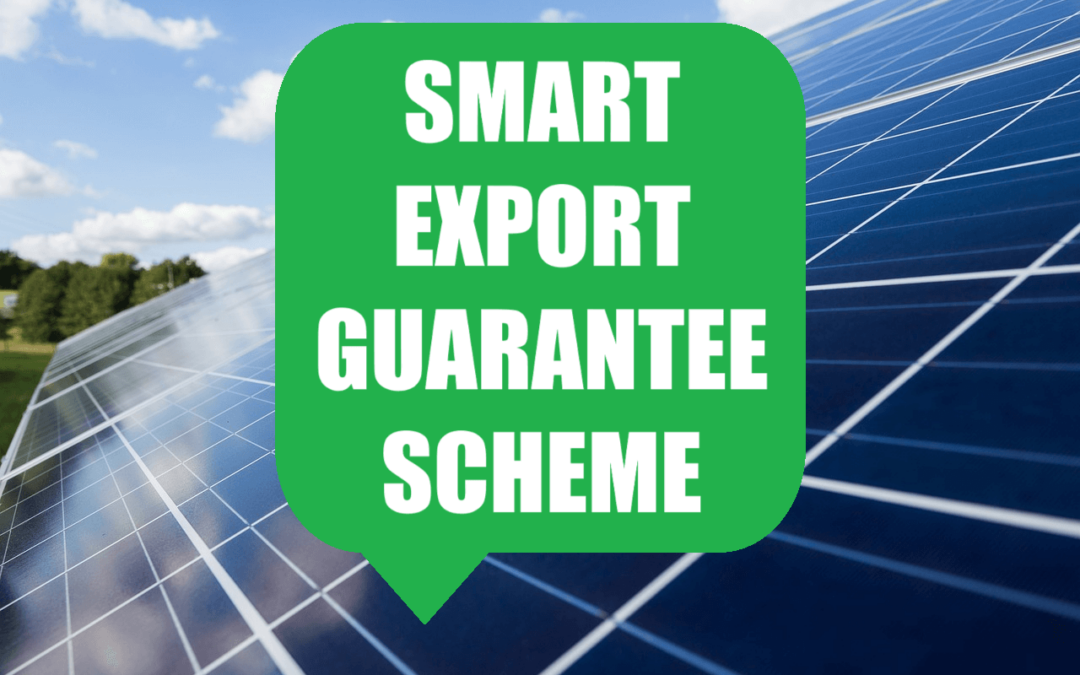Last Updated: 28 February 2024
What is the Smart Export Guarantee (SEG) Scheme?
The Smart Export Guarantee (SEG) Scheme is a UK Government-backed initiative that launched on 1 January 2020. It requires the larger electricity suppliers, known as SEG Licensees, to pay small-scale generators, known as SEG Generators, for low-carbon electricity which they export back to the National Grid, providing certain criteria are met. The Smart Export Guarantee (SEG) Scheme replaces the Feed-in Tariff (FiT) scheme which ended on 1 April 2019 for new applicants.
The Smart Export Guarantee (SEG) Scheme aims to encourage more people to install renewable energy technologies in their homes or businesses, such as solar panels, wind turbines, hydro power, or micro combined heat and power (micro-CHP). By doing so, they can reduce their carbon footprint, they can save money on their energy bills, and they can earn extra income by selling their surplus renewable electricity back to the National Grid.
How does the Smart Export Guarantee (SEG) Scheme work?
To be eligible for the Smart Export Guarantee (SEG) Scheme, you need to have a renewable electricity generating system that meets the following criteria:
- It has a capacity of up to 5MW (5,000kW), or up to 50kW for micro-CHP.
- It is located in Great Britain (GB).
- It is certified by the Microgeneration Certification Scheme (MCS) or equivalent.
- It has a meter capable of providing half-hourly export readings (usually a smart meter).
If you meet these requirements, you can apply for a Smart Export Guarantee (SEG) scheme tariff from any SEG Licensee of your choice. You can find the list of current SEG Licensees below, with their website details. Your SEG tariff supplier does not need to be the same as your energy supplier, but if your SEG tariff supplier is the same as your energy supplier you can get better SEG tariff rates.
SEG Licensees are free to determine the rate, contract length, and other terms of the SEG tariff or tariffs they offer. However, they must always pay you more than zero for your exported electricity. You should shop around and compare different SEG tariffs to find the best deal for your situation. Remember your SEH tariff supplier doesn’t have to be your energy supplier.
SEG payments are calculated by using your export meter readings. You will be paid by your chosen SEG Licensee for the electricity that you export back to the National Grid. You will not be paid for the electricity that you use yourself, but you will save money by importing less from the National Grid.
If you have a storage device, such as solar battery storage or an electric vehicle, that can import and export electricity, you may also be able to benefit from the SEG. Your prospective SEG tariff supplier can advise you on how this works.
How much can you earn from the Smart Export Guarantee (SEG) Scheme?
The amount of money that you can earn from the SEG depends on several factors, such as:
- The size and type of your renewable energy system.
- The amount of electricity that you generate and export.
- The rate and terms of your SEG tariff.
- The time of day and season that you export electricity.
To get an estimate of how much you could save and earn from installing a renewable energy system and joining the Smart Export Guarantee (SEG) Scheme, you can use the Energy Saving Trust calculator. This tool will also help you compare different technologies and suppliers.
How to apply for the Smart Export Guarantee (SEG) Scheme?
If you are interested in applying for a SEG tariff, here are the steps that you need to follow:
- Install a renewable energy system that meets the eligibility criteria and get it certified by MCS or equivalent.
- Get a smart meter installed if you don’t already have one.
- Contact a SEG Licensee and ask for their application form and terms and conditions.
- Fill out the application form and provide proof of ownership and certification of your system.
- Sign a contract with your chosen SEG Licensee and start receiving payments for your exported electricity.
You can switch between different SEG Licensees at any time, as long as you comply with their terms and conditions. You should regularly check the market to see if there are better offers available.
To receive Smart Export Guarantee (SEG) Scheme payments, you’ll first need to apply directly to an energy supplier which offers a SEG tariff. Energy suppliers who offer SEG export tariffs are listed below:
Full list of licensees who advised Ofgem that they are SEG Licensees for the fourth SEG year: 1 April 2023 to 31 March 2024
Mandatory Smart Export Guarantee (SEG) Scheme Licensees
British Gas
- Smart Export Guarantee – British Gas
- Business Smart Export Guarantee | Help & support | British Gas business
E (Gas & Electricity)
E.ON
- Sell energy with the Smart Export Guarantee | E.ON Next (eonnext.com)
- smart export guarantee terms conditions final (002).pdf (eonenergy.com)
EDF Energy
Octopus Energy
OVO Energy
Scottish Power
Shell Energy
So Energy
The Utility Warehouse
Utilita
Voluntary Smart Export Guarantee (SEG) Scheme Licensees
Pozitive Energy
Rebel Energy
The Best SEG/Export Tariffs in February 2024
Here are the best and worst SEG/Export rates out there, as of February 2024.
| ENERGY SUPPLIER | PRICE (p/kWh) | NAME OF TARIFF |
|---|---|---|
| Octopus (own customers with a GivEnergy Solar Battery) | 35p* | Intelligent Octopus Flux |
| Octopus (own customers with a solar battery) | 30p* | Octopus Flux |
| OVO (own solar customers with a battery) | 20p | OVO SEG Tariff |
| Good Energy (own solar customers with a battery) | 20p | Solar Savings Exclusive |
| So Energy (own solar customers) | 20p | Smart Export Guarantee Tariff |
| E.On (own customers) | 16.5p | Next Export Exclusive |
| Octopus (own customers) | 15p | Outgoing Fixed |
| OVO (own solar customers) | 15p | OVO SEG Tariff |
| Scottish Power (own customers) | 15p | SmartGen+ |
| British Gas (own customers) | 15p | Export and Earn Plus |
| Good Energy (own customers with a smart meter) | 15p | Solar Savings |
| Scottish Power (non-customers) | 12p | SmartGen |
| Octopus (own customers on Go tariff) | 8p | Outgoing Fixed Lite |
| So Energy | 7.5p | So Export Flex |
| Rebel Energy | 6-10p | SEG Tariff Snail |
| British Gas (non-customers) | 6.4p | Export & Earn Flex |
| EDF (own customers) | 5.6p | Export Variable Value |
| Utility Warehouse (customers) | 5.6p | UW Smart Export Guarantee – Bundle |
| Pozitive Energy | 5p | SEG tariff |
| Octopus (non-customers) | 4.1p | Outgoing Go |
| OVO (non-customers) | 4p | OVO SEG Tariff |
| Utilita | 3p | Utilita Smart Export Guarantee |
| EDF (non-customers) | 3p | Export Variable |
| E.ON (non-customers) | 3p | Next Export |
| Utility Warehouse | 2p | UW Smart Export Guarantee – Standard |
| E | 1p | E SEG January2020v.1 |
The Best SEG/Export Tariffs in November 2023
Here are the best and worst SEG/Export rates out there, as of November 2023.
| ENERGY SUPPLIER | PRICE (p/kWh) | NAME OF TARIFF |
|---|---|---|
| Octopus (own customers) | 29.3p* | Intelligent Octopus Flux |
| Octopus (own customers) | 24p* | Octopus Flux |
| OVO (own solar customers with a battery) | 20p | OVO SEG Tariff |
| Good Energy (own solar customers) | 20p | Solar Savings Exclusive |
| So Energy (own solar customers) | 20p | Smart Export Guarantee Tariff |
| E.On (own customers) | 16.5p | Next Export Exclusive |
| Octopus (own customers) | 15p | Outgoing Fixed |
| OVO (own solar customers) | 15p | OVO SEG Tariff |
| Scottish Power (own customers) | 15p | SmartGen+ |
| British Gas (own customers) | 15p | Export and Earn Plus |
| Good Energy (own customers on SVT) | 15p | Solar Savings |
| Scottish Power (non-customers) | 12p | SmartGen |
| Octopus (own customers on Go tariff) | 8p | Outgoing Fixed Lite |
| So Energy | 7.5p | So Export Flex |
| British Gas (non-customers) | 6.4p | Export & Earn Flex |
| EDF (own customers) | 5.6p | Export Variable Value |
| Pozitive Energy | 5p | SEG tariff |
| Octopus (non-customers) | 4.1p | Outgoing Go |
| OVO (non-customers) | 4p | OVO SEG Tariff |
| Shell Energy | 3.5p | SEG V1.1 Tariff |
| Utilita | 3p | Utilita Smart Export Guarantee |
| EDF (non-customers) | 3p | Export Variable |
| E.ON (non-customers) | 3p | Next Export |
| Utility Warehouse | 2p | UW Smart Export Guarantee – Standard |
| E | 1p | E SEG January2020v.1 |
You should note that your current energy supplier does not need to be your Smart Export Guarantee (SEG) Scheme tariff supplier – these can be two separate companies. Any energy suppliers who are part of the Smart Export Guarantee (SEG) Scheme are obliged to offer you a SEG tariff, and this can be either fixed or variable; with the terms and conditions being set by the energy supplier. Smart Export Guarantee (SEG) Scheme tariffs can change over time, so be sure to carry out regular checks on whether your SEG tariff is still competitive.
If you are interested in installing solar panels at your home or business, contact us today on 01268 928 690 or via the ‘Enquire Now’ button below. We are an accredited MCS installer of solar panels and battery storage solutions so we can install your complete Solar PV System to MCS Standards and we can help you with every step of the process, from a free no-obligation quote and solar PV system design service to installation to aftercare.
Frequently Asked Questions about the SEG scheme
The Smart Export Guarantee (SEG) scheme enables small-scale low-carbon generators, like homeowners, to receive payments from electricity suppliers for electricity exported to the National Grid, providing certain criteria are met.
The Smart Export Guarantee (SEG) is a good idea. It forces energy suppliers to financially reward consumers who send their excess renewable energy back to the National Grid, which makes the UK’s electricity cleaner, greener and cheaper. However, its fatal flaw is that energy companies can pay any amount for your energy as there is no standard rate.
Who Offers the Best SEG Rates? At present, energy supplier Octopus Energy offers the best SEG tariff export rate in the UK. They pay 15p for every kWh you provide from your solar or another renewable system to the National Grid. The catch with Octopus Energy is the fact that you have to be one of their current energy customers to get the higher SEG rate, otherwise its SEG tariff for non-customers is only 4.1p kWh.
If you generate renewable electricity in your home or business, you can feed back into the National Grid any electricity that you don’t use. Under the Smart Export Guarantee (SEG) scheme you will be paid for every unit (kWh) of electricity that you feed back to the National Grid. You will need to have your solar PV system installed by a MCS Certified Solar PV (Panels) Installer like NXTGEN Energy, as you are required to have an MCS Certificate. An MCS Certificate proves that your Solar PV System has been correctly installed to MCS standards.
This, of course, is on top of the lower energy bills that you should be able to enjoy as a result of your solar energy investment. Currently Octopus Energy pays the best rate for excess solar energy exported back to the National Grid at a rate of 15p per kWh. E (Gas & Electricity) pays the lowest at 1p per kWh.
Latest Solar Panel Grant Posts
- Smart Export Guarantee (SEG) SchemeLast Updated: 28 February 2024 What is the Smart Export Guarantee (SEG) Scheme? The Smart Export Guarantee (SEG) Scheme is a UK Government-backed initiative that launched on 1 January 2020. It requires the larger electricity suppliers, known as SEG Licensees, to pay small-scale generators, known as SEG Generators, for low-carbon electricity which they export back… Read more: Smart Export Guarantee (SEG) Scheme
- Energy Company Obligation (ECO4) Scheme 2023Last Updated: 6 November 2023 Energy Company Obligation (ECO4) Scheme (Including LA Flex) 2023 The current UK government Energy Company Obligation (ECO) Scheme Phase 4 (ECO4) which is managed by Ofgem focuses on improving the country’s least energy-efficient homes and is primarily aimed at low-income and vulnerable households in the Great Britain. Through the ECO4… Read more: Energy Company Obligation (ECO4) Scheme 2023
- Home Upgrade Grant UK 2023 (HUG2)How to Get Free Solar Panels with the Home Upgrade Grant (HUG2) If you live in England and meet certain criteria, you may be eligible for a Home Upgrade Grant (HUG2) that can cover up to 100% of the cost of installing solar panels on your roof. The Home Upgrade Grant Phase 2 (HUG2) is… Read more: Home Upgrade Grant UK 2023 (HUG2)
- Solar Panel Grants UK 2023/2024Last Updated: 28 February 2024 Are you looking for the latest information on solar panel grants UK in 2023/2024? Did you know that solar energy is one of the most eco-friendly and cost-effective ways to power your home or business. But installing solar panels can be a big investment that not everyone in the UK… Read more: Solar Panel Grants UK 2023/2024




